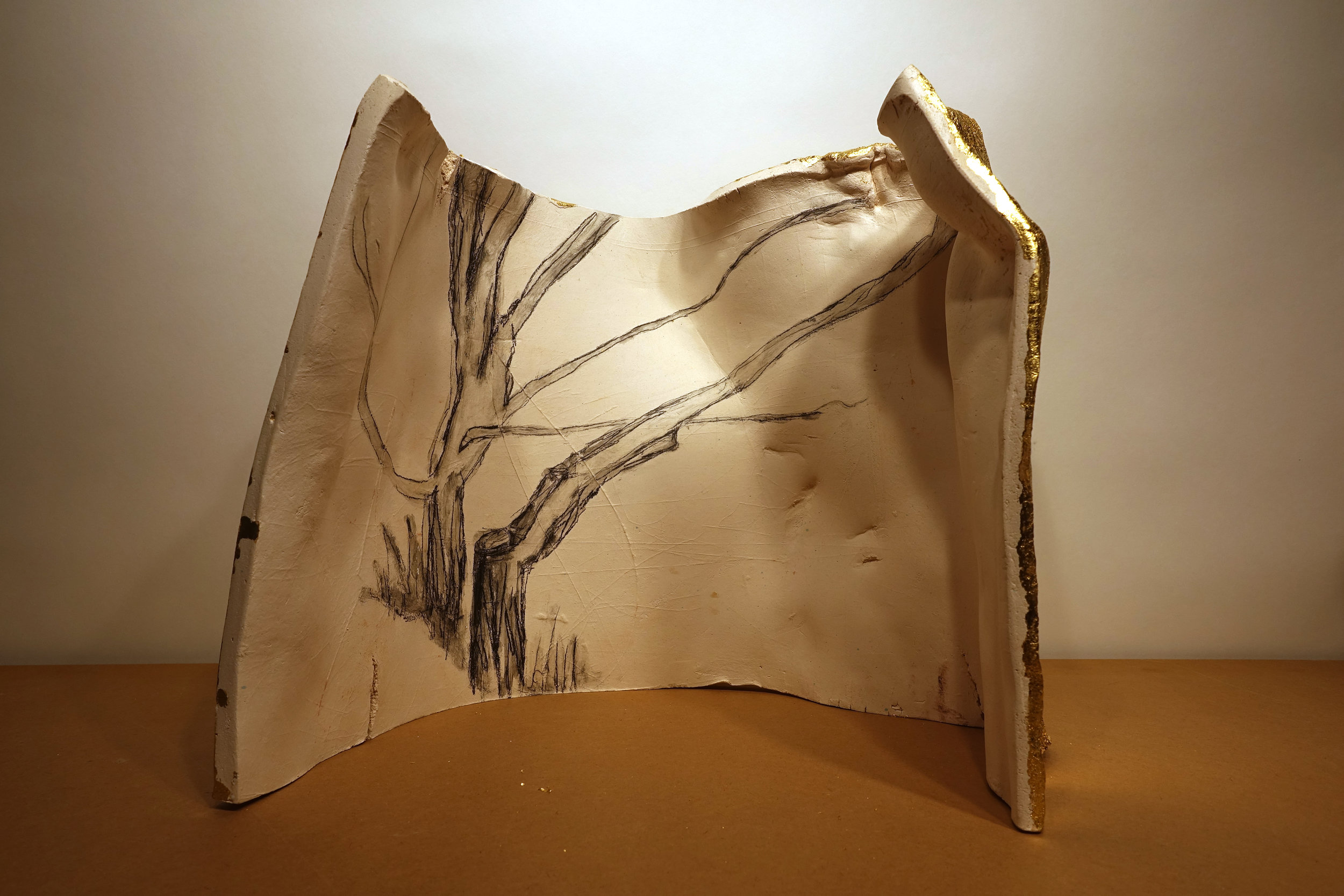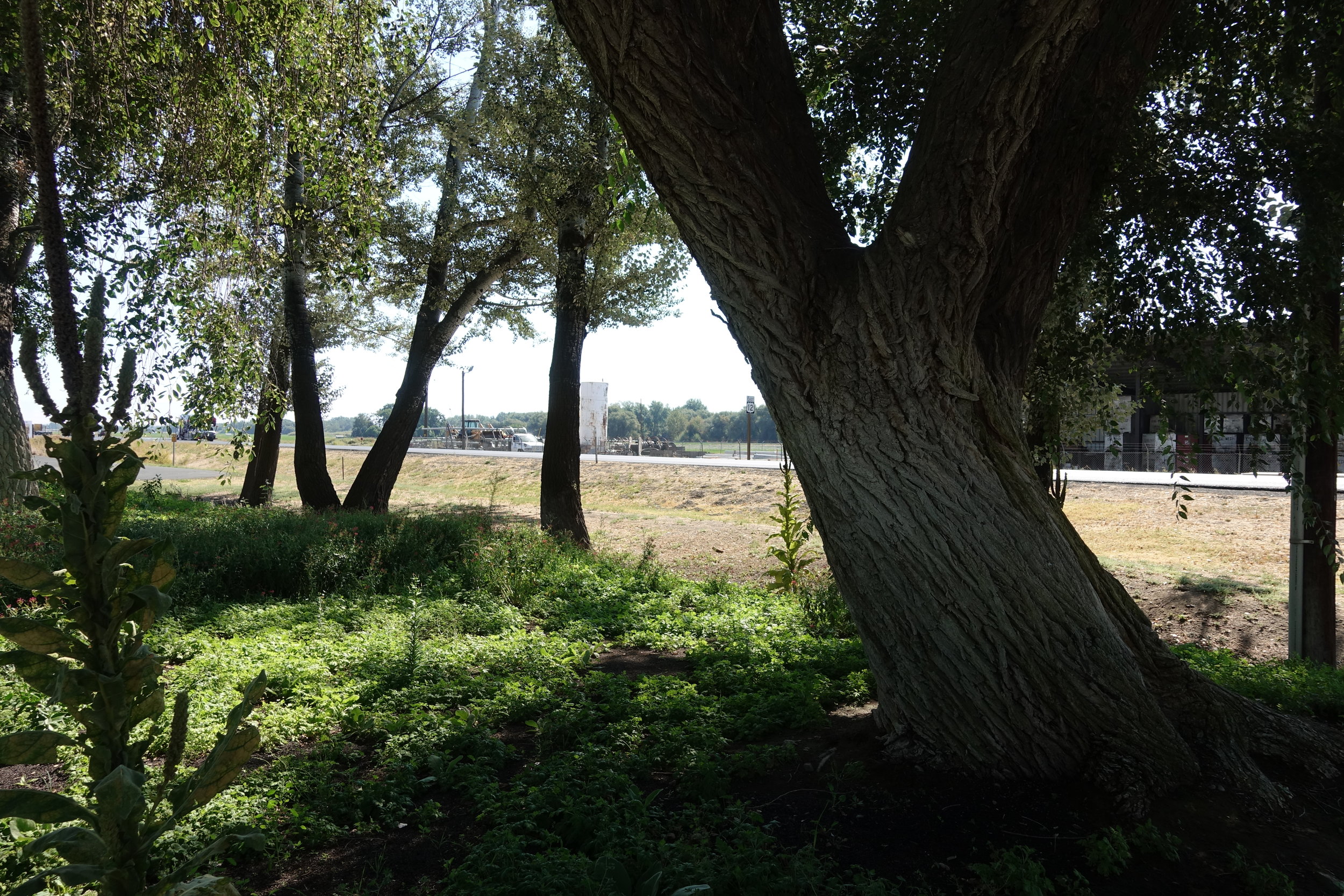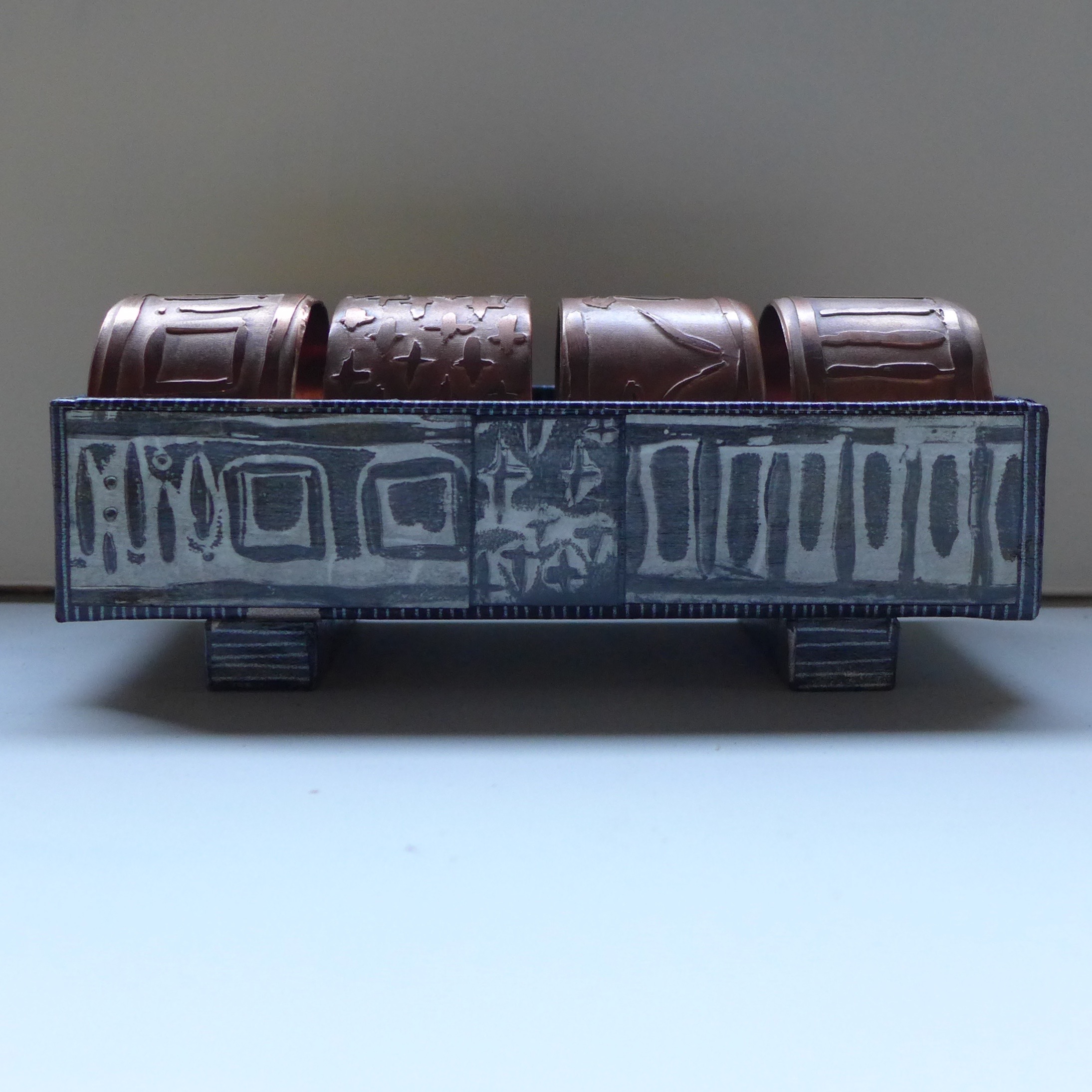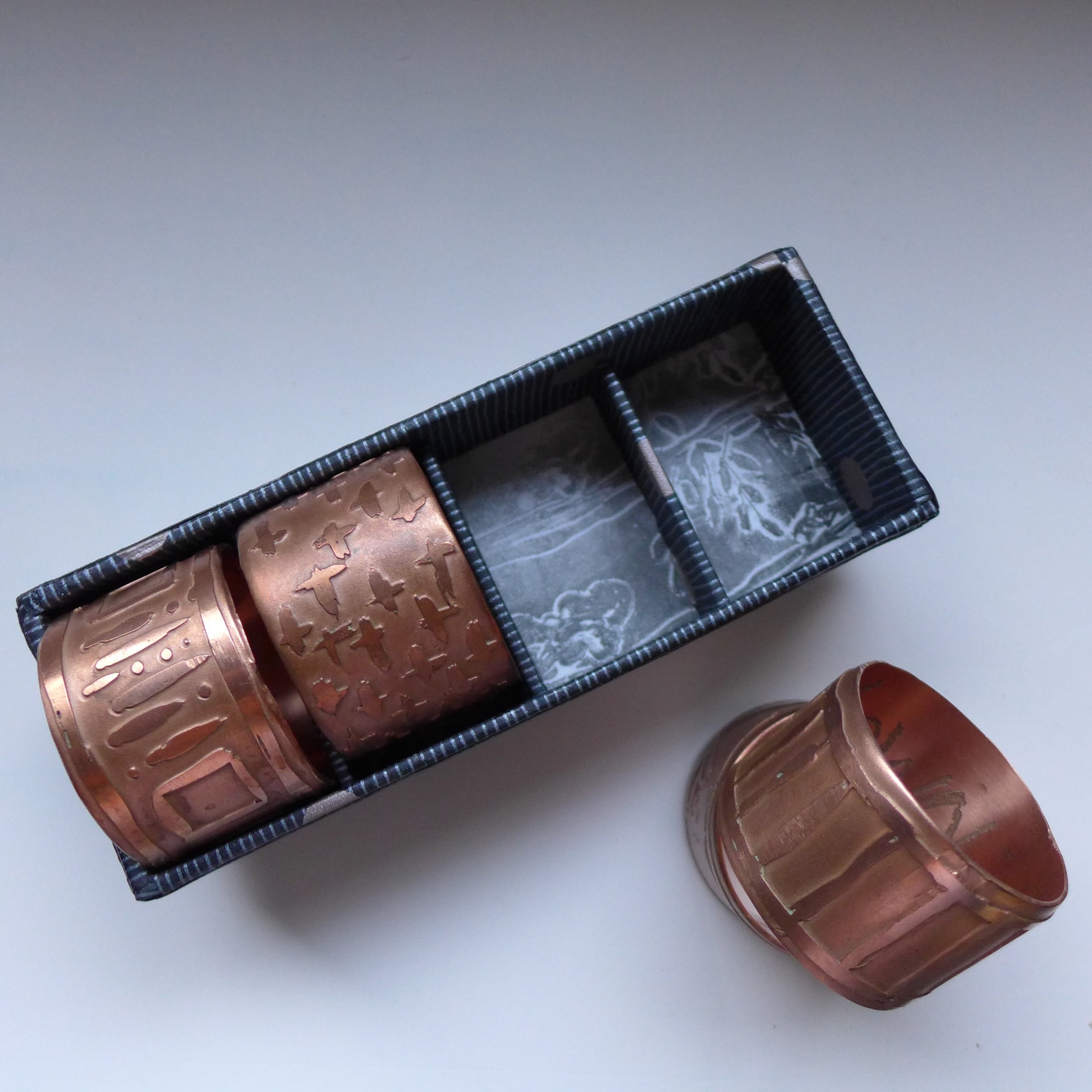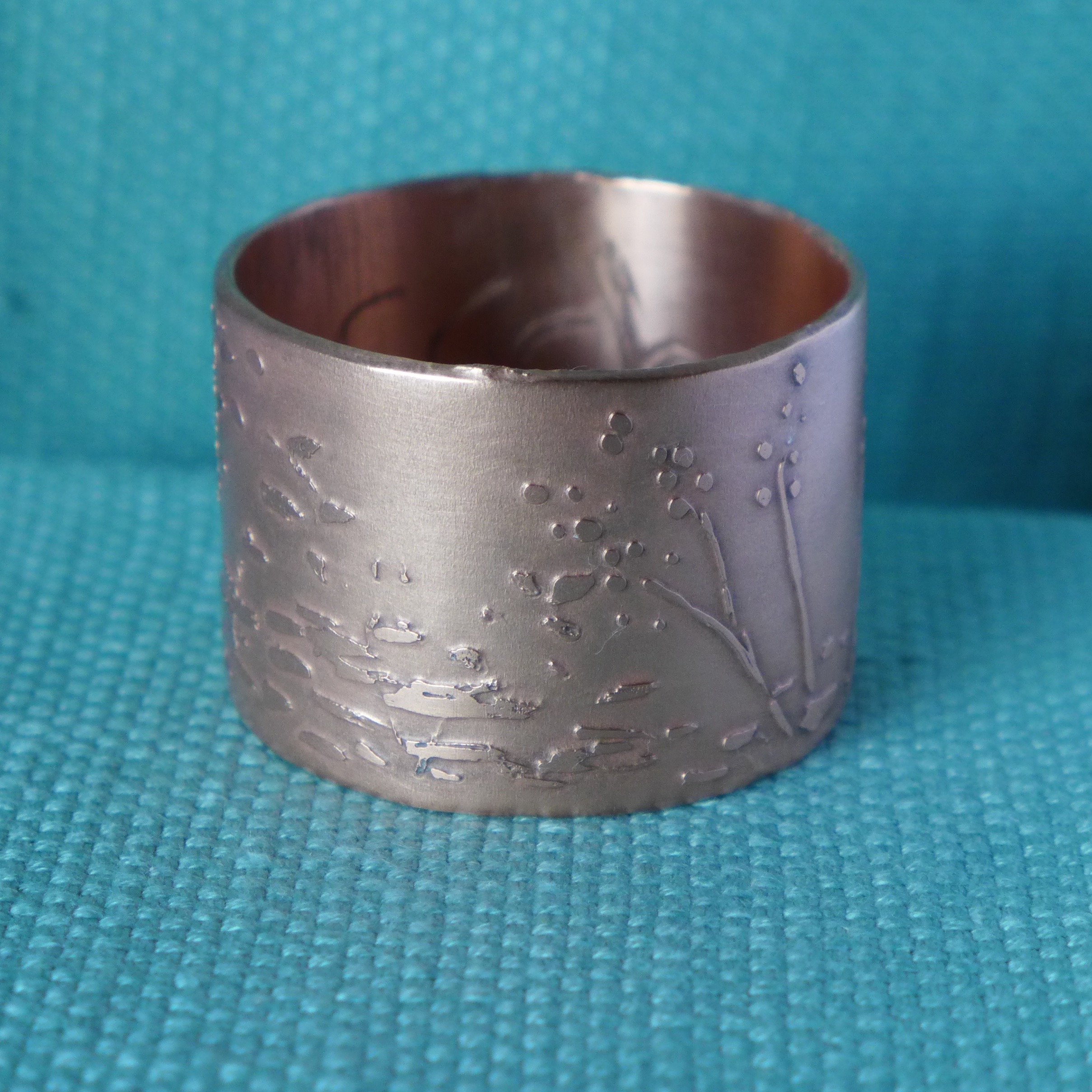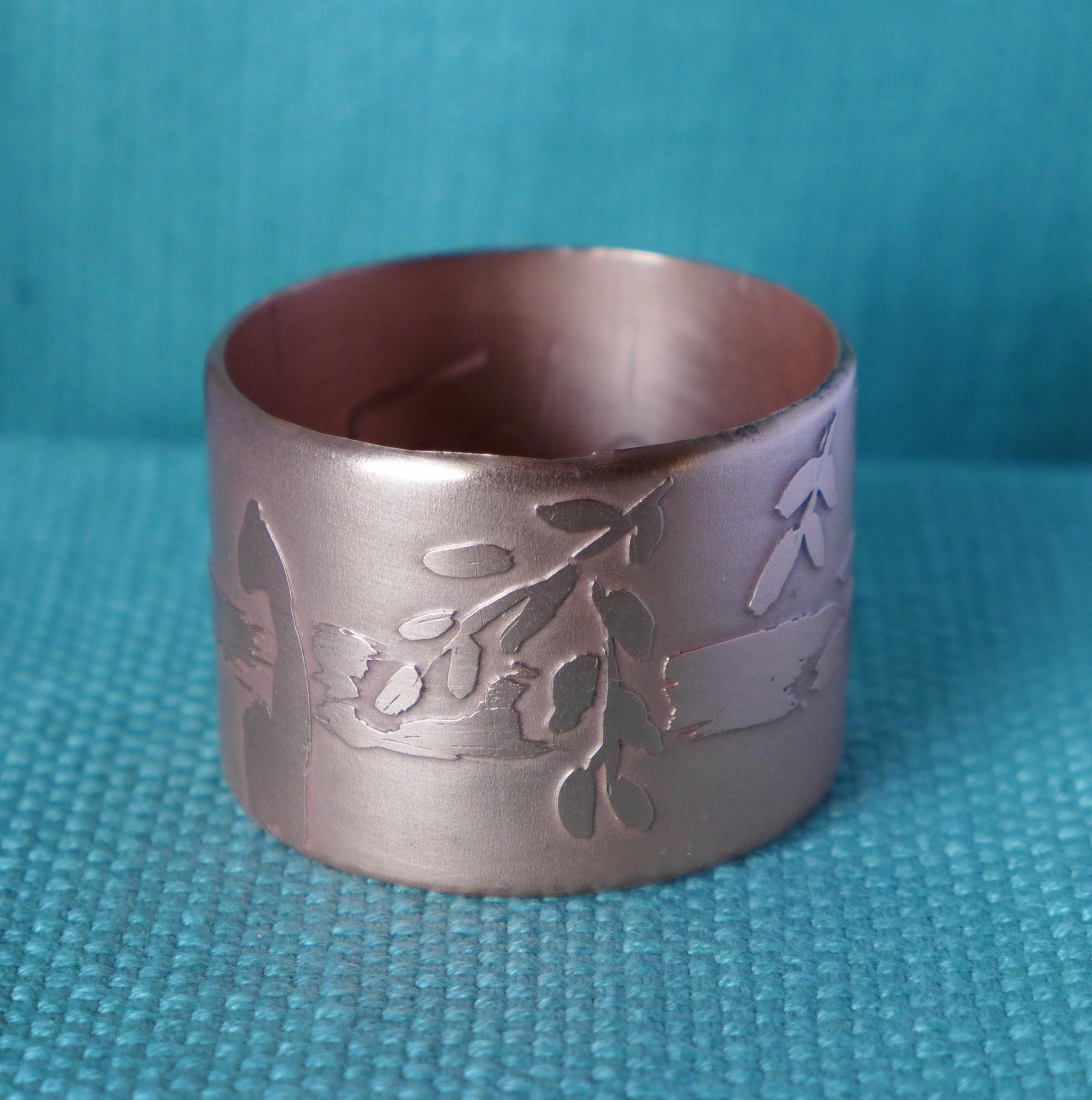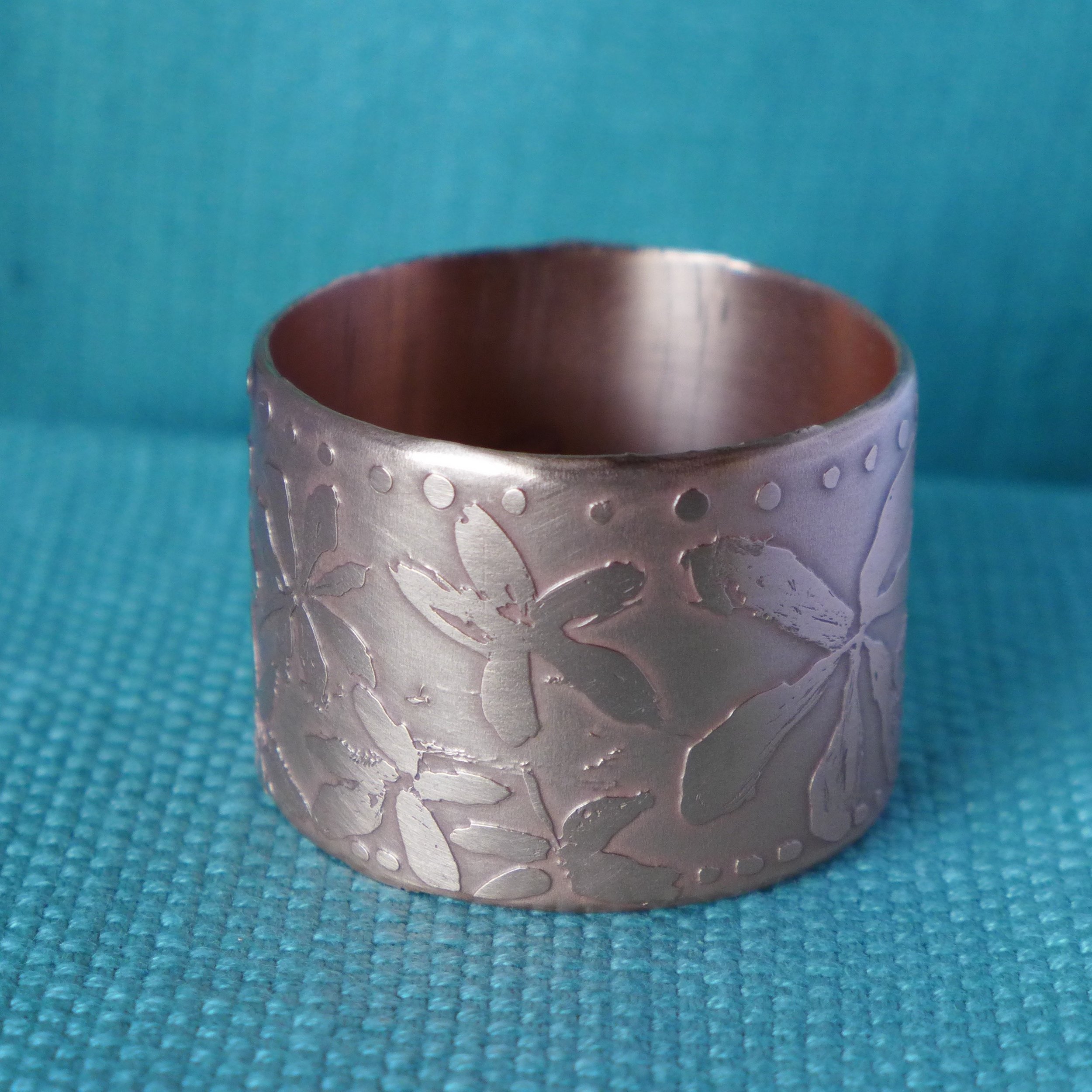True enough. The forests of Walden, an eccentric home life, and the traditions of large format photography conspired. With motherhood still leaving the gifts of used tissues and multitasking lists in her pockets, Augusta returned to mark making and photography. Her work is influenced by walking, and watching plants interact like her children, lover, friends, and foes. Augusta constructs art to redefine spaces, reflecting where she has been and where she wants to be.
Here is the thing
You may have heard, I'm coming to Seattle.
I would like to barter
a set of 6 gorgeous napkin rings and container for them to live in,
for your dinning room table from my latest body of work.
The proposition is in exchange for a home in Seattle, from November 8 -13.
That's a ring per night, plus a sweet 6th to round out the dinner party. I will be in town for NicheOutside's Capitol Hill artist's walk with two projects.
The Napkin Ring Project, and The Moveable Feast.
Much gratitude, if you even consider this. Send me an email if you are interested in artist patronage.
Art Squared, (or why I want to punch people buying art from box stores.)
For the last five years, I have donated an idea and used summer hours. I work through 10 six by six squares for Art Walla's fundraiser ArtSquared. Selling about 6 to 9 each year, this feat always shows me what worked and did not, in a furiously fast experience, and without much discussion. I do it for the greater good. Hell, I assume we all do.
It gives an opportunity for the community to buy and live with art. For $36.00 the pieces are really small, and for someone like myself, they look like sticky notes placed on my walls. This is not super attractive, and yet it reminds me that: oh yes- I like this artist. I need to follow their thoughts, and when given a chance, buy a larger more thought out work.
For now, this will do, until then.
So why the violence?
Alter or Altar
With out a doubt I have a special gift for redefining words. I have lost and won friendships with them. Peculiar as my mind is, I have been interchanging the spellings for Alter and Altar for the last three months. Irony, or not, I do think they are interchangeable. It is my art, so my rules right? I had a response, that I have permission to share, with a history of Altars. Certainly I do like to pick my facts, like any good agnostic would. Which ones do you think I chose to keep and which do you think I'll disregard?
Altars and Apsides
By Steven Woolley.
You sort of asked; it’s all that’s needed to push the starter and get me going. So let’s talk about altars.
Like I said, an altar is almost always something in the form of a table on which sacrifices are made to the gods. A sacrifice is an action done to make something sacred or holy, and thus acceptable to the gods. There may be ancient religions without sacrifices, but I don’t know them. Even Buddhism, which has no clear idea about god, has altars and sacrifices.
Our common idea of a sacrifice is to kill or destroy something of value, hoping it will be acceptable, with the idea that, since it’s no longer is present to us, it’s become present to the gods. If the gods like it, maybe they’ll do something nice in return. After all, what could be ore costly than a life, or something of material value? Surely the gods will be pleased.
The ancient Jewish tradition, from which our western ways of thinking come, is a little different. God, does not need the sacrifice, it’s not a bribe to get God to do something (although a lot of people can’t get that out of their heads). The sacrifice of an animal or first fruits of the harvest was intended to be costly, the best and first of what one had, as a sign of commitment to a relationship with God and obedience to God’s law. God didn’t need to get it. The people needed to give it. Think of it as God’s version of the old rule that you can’t give away kittens, but you can sell sell them. Needless to say, it got corrupted in dozens of ways, all of which are duly recorded in the Hebrew scriptures. The tradition from which we emerged was nothing if not honest about its own shortcomings.
The Jewish temple in Jerusalem was destroyed by the Romans in 70 c.e. (the Common Era), and Jewish sacrifices ceased, never to be restored. In the meantime, the new Christian faith went in another direction. Each week they gathered for worship and shared a simple meal of bread and wine, which they understood to be both a remembrance of the Last Supper, and a participation in the actual presence of Christ in the bread and wine. It was a sacrifice in which they presented the bread and wine to God who made it into holy food and drink to nourish them for the days ahead. Then they presented themselves, their bodies and souls, to be holy and reasonable sacrifices to God – that is, they presented themselves to be made holy and useful to God. Being human, it doesn’t last. That’s why it was repeated each week. Because the rite was sacrificial, the table at which it was celebrated was an altar.
As the centuries passed the rite became corrupt. Somehow the priest was understood to be repeating Christ’s “sacrifice” on the cross, and the idea of sacrifice drifted back to seeking God’s favorable response for something. For instance, paying a priest to say a quick mass could get your dead loved one out of purgatory a little faster. The more masses, the quicker he or she could get out. Sort of like TSA precheck financed with bribes to the agents, and a great money maker it was.
500 hundred years ago things had become so bad that a German priest named Martin Luther nailed 95 complaints to the door of his small town church, asked for debate, and demanded reform. It didn’t stay local. Thanks to the printing press, it got published and sent around the Holy Roman Empire setting fire to the Reformation. Thirty years later the Church had divided into Protestants and Roman Catholics, and both had reformed their ways. Since then, the Church has continued to divide into various sects and denominations, each with it’s own understanding of what Christianity means, and disagreements about altars and sacrifice.
Most Protestant churches don’t have altars. They don’t even like the word. Many have Lord’s Tables, used occasionally for a form of Holy Communion not considered to be sacrificial in any way. Many others don’t even have that – just a performance space for speakers and musicians. Churches remaining in the Catholic tradition: Roman Catholics, Anglicans (Episcopalians in the U.S.), Lutherans, and some others, do have altars. And they are called that because they remain places of sacrifice, in the old sense of presenting ourselves as holy and reasonable sacrifices to God as we are fed with the holy food and drink of bread and wine in which Christ is truly present.
So, what about your altars. It’s two part answer. First, I love them. Their design invites the viewer into a sacred space where intimacy with God, as they understand God, may happen. Sacred moments like that make the viewer sacred, at least for the moment, and the sacrifice has taken place, no ritual required. Yes, but where’s the altar, the table? In the mind of the viewer. Maybe not so oddly enough, your altars are in the shape of a basilica apse. Here’s the second and last part of this too long note. An apse is the semicircular space behind the altar in a basilica style churchIn Roman times a basilica was something like a town hall or legislative assembly building. The governor would sit on a raised platform in the apse to do whatever Roman governors did. As the early Christian church grew out of house churches and into dedicated buildings, it copied the basilica style as a statement that it is God and not the emperor who sits in judgment, and it is God and not the emperor to whom Christians give their ultimate loyalty. The style is still common today.
So your altars reside in the apsides (that’s the plural I guess) you have created, there for each viewer to discover in her or his own way.
My Anglian tradition is heavily laden with Celtic Christianity ways of thinking, one of which is the idea of thin placesThin places can exist anywhere at anytime, and are places where the boundary is very thin between the holy and the profane, heaven and earth, material and spiritual. The drawings that adorn your altar spaces evoke, for me, the idea of thin places, and invite the possibility that they may become one, at least for a few seconds.
The End
For more of the Country Parson's writings stevenwoolley.com
Sexy tree creatures and fear, again.
The mullen was in awe of the mad sexy beast of a tree. Me too.
So I have continued the photography at full force, and what seems to be the linking sensation is - song. Or rather the fear that induces song. The shock to the system has really gotten my childhood repertoire up to the forefront of my mind. "Just a boy and a girl in a little canoe..." shields be from cougars. Whistling random Mozart tunes keeps the rattle snakes away. I only wish the made up opera would make the star thistle pull itself up and be gone.
In honor of all things great and small.
Miniature Theater found in an antique store in Sante Fe, New Mexico 2017
Why the alter? Is it not the most religious route? For a woman who believes in the sun and the moon and the stars- why this? If Mary Oliver suggests "Attention is the beginning of devotion"- does she not mean, the attention extended to all things great and small.
If art is in relationship to the mind and body, these alters are miniature theaters of process. I am curious about the attention that concave space can create. Innate by design, the moveable feasts offer different things: blinders, reflecting sound, solitary space or that one little thing that I want to show you. A series of alters - In honor of all things great and small.
Boca de Chorro
I thought I had known New Mexico before. This time, I had just watched “I Love Dick” and I had been summoned.
Shadow Tree, Cynthia Patterson. Taos, New Mexico 2017
I was sent for by the artist Lynda Benglis, to share her desert studio space. She decided I would take leave of my family, and work on my art. Using photography, drawing and sculptural ceramics, I processed my abstract allegories. She in turn started what she wanted- the Boca de Chorro residency.
In revisiting New Mexico I learned how wildly young I had been before. Standing calmly I held my space quite differently, out in the desert alone. Now, a woman in my forties, I held the responsibilities of children, marriage, and time that can not be attained without jumping the ravine.
Inner Garden. Sante Fe, New Mexico 2017
The body of work evolved from making spaces to live in, to alter spaces that one can relate to. The shifting of home-centric meditations to movable feasts.
The one that got away... The first alter, before it broke. Saxe Patterson. Taos, New Mexico 2017
The first showing of this body of work will be slowly replacing Margaret Walter's "40 Years of Painting Out". A closing event will be posted for September, when the new work has taken over the space. Visit through the month as the two shows merge and shift.
Studio Two Zero Two
202 Main Street
Walla Walla, Washington
Her self and her dress. New Mexico 2017
This blog is made from process images.
Margaret Walters. 2017
Margaret Walters: 40 Years of Painting Out
Building for my possibilities
Funny thing, watching my husband Dylan jump on his old commuter bike to restart the habit. Early work means five am departures in a sleeping town. I had picked out the bike for him, with my idea of what he would want. Green. Lights. A water holder. Multi gears. Panniers. The works. Paid with my precious flower money all those years ago. Back when George W was the world’s worst president, and oil was the reason for war. Albeit paired down, the top notch set up worked as his means of commuting for over 5 years. As things shifted, and so did Dylan’s attention. The sitting bike became my son Henry’s ride, before his license and the tires of rubber became four.
Last night Dylan stated, at dinner with friends, he had renewed the effort, to see if he "needed" a new bike. Truth was, he had always wanted something different. Silence. Single gears. Stream lines. Blue... or "murdered out Black." Permission was only self granted with practiced dedication.
This could be said about my studio, I used the space to prove that I would. Coating every surface with the urgency of time lost, and ideas spinning. Machines piled with new projects, tools were added and learned and improved. Work covered the walls
But.
Fuses caught on fire, bugs crawled through cracks, and the ceiling shed over freshly gessoed surfaces.... when squirrels scrabbled over head. This was nothing in comparison to the wind, the heat and ultimately the cold.
This spring, new electricity, insulation, wood sheeting and drywall makes for a new space, in an old garage. Stable, safe and clean come with a reckoning.
In 2013 I had my first break out show in our valley, at AMO ART. A year of time, to build a show. I pushed myself off the kitchen table scratching into space and mass and idea. Atmosphere paintings, massive drawings, and a free standing screen took up the lion share of the gallery. I made the work and then I presented myself as an artist. This was no small feat, for a woman who knotted and tied herself with the obligations of family.
Much of that work sold, and found homes. I stored the screen. Made of 6 sheets of 4 x 8 foot sign wood attached to 6 handmade frames. These peculiar frames, that I assembled out of joist braces and 2 x 2 stick lumber, were bigger then needed. I could not manage to make them fit. Fitting meant more cutting, and more complications than I was prepared to do. Pulling the screens apart I recalled the pain and process of assembling them.
The first studio. The concrete as my table, and the fence as my walls. The z-hangers still reside on the fence as a marker, and the house has new owners.
As this was several years ago, in a land before a studio space. I worked on a hot open drive way. The concrete as my table, and the fence as my walls. My comfort tools were mostly for painting and plastering. Things that had to be built were made with a hand saw, and my husband’s screw gun (which was I constantly in trouble for using). Regardless, I was determined to not need other people’s help or worse - to wait for other people to help.
Needless to say, the screen was an undertaking I was proud to store. This was my work and a symbol of my leap.
Yesterday, like all dreams that come to an end, I held my breath. Maybe I should show the screens one last time, creating rooms that are…. I opened the stored panels, and noted the perfection of the screws placement. I easily removed the stick frames off the back. Low and behold, the work did not hold up. The work that I had stored with insistence, was not what my memory had assumed. My preconceived notion was an ungrounded idealization - like a crush, that is consummated with a lukewarm kiss.
Vindication. By placing a wood layer, I can attach any work to any place in the wall. The power of the screens, remains as a blessing. The wood sheets are being hung as I type.
Let no stud hold me back.
Sidenote: This process was months, if not years, in the making. After multiple diversions, and self ridicule, the studio was disassembled and the project began. Thanks to my friend Molly's urging, I simultaneously I began to obsessively watched Jill Soloway, Elieen Myles, & Chris Kraus's I love Dick.
Mari Jalbing
Many years ago I was invited to a luncheon at Sonia Schmitt's house. Sonia had been both a mentor and a friend for many years. She was the first to hire and more importantly instruct me to become a florist at her restaurant, White House Crawford, in Walla Walla. For nine years I built flower arrangements at her restaurant, and over the course of 17 years, we have become friends.
I don't know what year it was, that Sonia invited a group of women, artists or art enthusiasts, to a luncheon at her home. We were gathered to honor a visiting artist and Sonia's dear friend who was having an art show at the administration building at Whitman College.
What I do remember was the artwork, paintings with college and brilliant color. I remember moving around both at Whitman and at Sonia's house with an electric feeling. I knew this. I got what it was. I liked this woman.
She was funny, and humble, and laughed. She made work of many layers, colors, and collage. I had been researching Romare Bearden, for Carnegie Picture Lab. I was very attuned to the thought process behind what collage meant. Or rather, what it meant to me- A confluence of sorts, different ideas, each addition to an image came from a different standpoint. Fitting together, her work made lush landscapes or a botanical representations.
This was all before I was making my work so seriously. I was dabbling. I still held the reins close to my heart. I was deep into Carnegie Picture Lab then. The Napkin Ring Project had yet to start. Walls were still being carved into, wood was burnt with patterns, drawing developed on tiles, I had yet to scream - I am an artist - at the top of my lungs. But I was standing on my toes and I was holding my hands close to my heart. I knew I was about to leap. When I met her.
Admittedly, I was taken, if not nervously so. If I may be so bold, we liked each other. There was a bit of an exchange. Back then I didn't have much to follow up with. I don't know why. I certainly was not comfortable with my own work yet. I wasn't traveling out into the world. I don't even know if I was reading novels. I was rebuilding myself. Life was my art program, my gardens, my small children, and let us never forget, my husband's work.
I asked Sonia about her, because Mari was first, her friend. I laughed when I heard her husband had been made a federal judge by President Bush. Oh dear, a conservative federal judge not my kind of people. I laughed heartily, as if I knew. Gah, I was so ignorant.
Today while I was driving my little blue truck, doing errands and watching the sky, NPR again talked about the Seattle Judge Robart and his decision to contest President Donald Trump's band of seven countries, primarily Muslim immigrants. Again I heard about the dangers that the world was racing towards. Again I heard the fear that blinds.
Who stands up to fear? What exists within the fortitude to be able to do this?
Today a man, who I once laughed at, stood up to halt the Trumpain. Today a conservative federal Judge, with quiet intention amidst a few bumbles and mumbles, sat alone on a bench in Seattle and spoke for our country. His word granted a temporary restraining order against President Trump's executive order. A man who makes his life with a woman. A woman who is an artist. An artist who uses layers, and colors, with bits and pieces of differing views, and pasts, and minds to build a new picture, a collective picture. This artist is Mari Jalbing.
Gifts of Generations Pasts
In a thought towards collecting my writing in one place. I am sharing an article written from The Carnegie Picture Lab Newsletter, 2014. It was at a time, when my work with Carnegie Picture Lab was starting to round up. Why yes that is me, with my handsome grandfather, in Concord, Massachusetts probably around 1975, just before my father lost his hands. It was a piece that helped establish a cycle of woven writing that I follow still. Just like the photographs that I make whether I am in New Mexico or Maine, my writing follows a similar folding, and then unfolding.
From the Carnegie Picture Lab Newsletter.
http://carnegiepicturelab.com/wp-content/uploads/2013/03/Carnegie-Picture-Lab-Newsletter-2014.pdf
Letters to the you in me.
excerpt: Jan. 25. 1 7
White flag
for the grenades
that we all feel like.
Is it not
that we come from privilege that
we can choose to not honor that privilege
and then expect to keep that privilege.
Visiting, due to a touch of the Cancer
In the event of finding ones self in a hospital.
Which seems to happen to everyone, class, race, or poverty not withstanding,
And given that you are in the waiting room, and not on the surgery table, the mind wanders. The mind seeks. Sadly sometimes it's questions of who is covering the voices of Disney's latest incarnation of the Lion King - Patrick Dempsey or Rob Lowe? Or perhaps it's a bit more.
As I waited, as my eyes sought calmness, as the hours were extended, the Lion King felt like a drug not a window.
During one break, My sister and I found a real window. And that was a relief.
But in the waiting room with three television sets, one with the Lion King. The second with the Wide World Wrestling Federation, with men and women in tights screaming and parading around. The third screen told us the stage of procedure progress. Either he was in procedure, out of procedure, ready for visitors, in PACU, or please check with Desk, recovering out of PACU.... our attention was held with distraction. The air heavy. Filled with families holding their breath, only to let out a sob when an unidentified code blue broke through the air. The scenario was not for the faint of heart. But like anything, we became accustomed.
Waiting.
We did not see art in the waiting room proper, to off set the screens. Only in the halls, where there was no place to sit. To be fair their was one print over the reception desk, and I can only imagine, it was there to give the waiting an alternative to look at. We, the waiting, were all guilty of sending piercing eyes to the only human who might know more about what was going on then us.
Our dad has had the opportunity to spend a great many hours in hospitals. As an old friend has said, he has a lot of history of surviving. And, of those many hours, days, weeks, the constant tv never brought him meditative healing or peaceful distraction. In the 1970s-1980s those hospital stays brought with them a conclusion- art in hospital rooms could be a care alternative, calming and meditative for the patient. Even using the existing monitors, a picture book of landscapes shown in slide formate, would be more calming then Dallas or Three's Company.
When my father left the hospital, he was a medical success of a new kind, he was the first manwith to have a transplanted hand. His right hand was now his left.
In the eighties, he began a picture book program using his photography combined with his grandmother's historic photography of Henry David Thoreau's Concord to create a video slideshow. According to him the nurses wanted to take over the images and he left it in their hands. Oddly, this practice has progressed, of course we've all seen it, as a screensaver on our personal computers. A similar version, using photoshopped images, is on rotation at my local dentist.
In my own work of creating spaces, and exploring art's role in society, I have revised my artist parent's work. This past year I worked on a proposal to draw with raw lines, unorganized gardens, and forests and wild plants in black and white, on therapy room walls and dosing rooms in a rehabilitation foundation. Maybe more remarkably, the proposal was designed to be a research platform for the foundation's doctors. Could immersive art provide a better experience to their clients? Although the proposal is still waiting for approval, the idea is thus: Using art as a tool to create an environment for a human to heal. To use art as an immersive experience for the client, and the clinician together.
Chanting fans and double teaming wrestlers, and the hours past our original prognosis. And I longed for somewhere that was healing, to me, the waiting family member- or as another friend later told me - as a great representation of the most feared individual at hospitals.... M.A.D. Middle Age Daughter, those terrifying women who come to advocate for their dear parents.
Earlier in the day, I was so heartened, when I arrived for the emergency operation. I flew into San Francisco the night before from winter, leaving my family and a successful art season in the North West. My sister, who had taken two days off from her horse training, left her husband and her baby with our mother, and was driving our father up from her farm in Interlaken. He had spent the week walking to photograph, his art practice is seeing. We three were ready, and basically healthy, except for a misdiagnosed tumor that had been growing for too long. All cancer aside, we felt strong.
Arrival destination.
I sat in a fully windowed hallway on a bench in the middle of a mural under a poem. Pulling my legs up, and tucking them under me, I sipped my (actually very good) Americano from the in-house coffee shop, I watched my dad and sister arrive. I was participating in what was clearly to become the money shot of the day. Clearly.
Upstairs the art moved back into frames, and they lived in the hall ways. They were destinations as the week wore on, for the patient, and us the dutiful daughters, to see as a reward for getting up and moving. Hobbling at first from exhaustion, we would move through the halls, dad resting on window sills to make phone calls, or to look at the view.
Talking to his dear mother Mary.
We would discuss the art, or the bygone process of silver prints. We found children's work and favored artists, sharing the halls. We explored to remember we could. When mobility was our friend, we found a patio, next to my father's room. Protected from the windy elements, we sun bathed.
Sun.
As we sat, the outside reminded us that when this was all through, there was still a world moving and building and growing. We were overdue for a real walk and the practice of seeing.
Long gone are the days to use the hospital as a place to heal and recover. That is best done at home. Staph is not a fun virus to play with, there was enough with the touch of Cancer that held us there.
And yet, healing begins in the quiet moments between beeping monitors and pin pricks.
Between catheters and drug needs. Minds need quieting, love without requests.
Elizabeth, and Bill
Exhausted from helping the healing, and tracking the details. Reactions and expectations, and explaining to each new person the nuances that made up Bill Anderson.
I just wanted a layer of art, to silently sits with us, without all the small talk. I didn’t want the Rob Lowe voice, which was actually Matthew Brodrick's to cross my consciousness. Thirty years later the role of art in hospitals and healing centers still hangs on science’s approval. Certainly, our dad had survived before, and he would again.
Let's get out of here.
If only to get back to what was important, walking and seeing.
Saturday, December 31, 2016
I looked down, and saw
my grandfather's socks
on my daughters feet.
Prepping, The Napkin Ring Project.
I dressed to go out. Really I did. I even woke up at 1 am to run out into the night to turn the studio heater on, because the snow had not let up.
But then it occurred to me. No one was home, and the studio is really just a dry space not a insulated warm space. The rings were in a clean state. I would be running back and forth anyhow. All I needed to do was apply and shine the wax on the napkin rings for photographing, and cataloging, and really... Lets be honest, no one was home.
So after grabbing a stash of records from the S section, or rather Nina’s neighbors, I lit a fire. Running in and out to collect my rings, I got distracted... with a conversation the children and I had yesterday about raising money for the YWCA years ago with our friends the Bowers. Real money (or so it was in our minds) was raised with these sweet bird feeder ornaments. And wouldn’t you know it, I just had the materials right here…. ten minutes later, this. Not bad right? Well now to watch if I have the bird's approval and love….
When I brought wood in, and realized some needed to still dry off from the snow... and the rings needed a shelf to heat up on for the wax to be applied. I reached deep, and pulled forth my inner Martha Stewart… Who knew a snow day could be so sweet.
So many new rings for the Holiday pop-up. This coming Sunday, December 11, 2016 at Saffron Restaurant, downtown Walla Walla. All afternoon, from 3-7 pm with Bubbly to share. See you there!!
December 2 2016
The copper is glinting all over the studio. Shiny hot spots. And all of my turned over panels, freshly painted to begin again, serve as platforms for the growing troops. Fearless they stand to gather the teams.
In the cold, cold studio, the napkin rings are mounting. Face and mind and fingertips, senses that also join the table, are acknowledged. The afternoon sun will illuminate.
Silver is the Perfect Color- Mike Henderson
Mike Henderson, Painter.
Quick History: Notes from an Interview.
During a lecture this past winter at Whitman College, Paul McCarthy, made a reference to a painter that had made an early impression on him. Influencing him to spray paint everything in his yard and everything he owned silver. This man, Mike Henderson, who painted in silver because “it was the answer,” was a classmate at San Francisco Art Institute before Paul left for the University of Southern California.
Apparently Mike Henderson did not really know, or register Paul until a few years ago. In March 2008, Paul curated a show of important influences, “Low Life Slow Life” at CCA Watts Institute for Contemporary Arts. Although he looked for other work, he ultimately showed, Nonviolence, 1965, 72 x 120 inches and Castration 1968, 72 x 120 inches. “Both works depict aggressive violence perpetrated by men in uniform, one wearing an arm band with a swastika.” Around the time of the show, Paul reminded Mike of a story from school. Mike had came back to his studio at SFAI and, found a painted silver paper with christmas lights on the floor of his studio, in front of his paintings. That, Paul pointed out, was him.
This July I approached Mike for an interview, to further my own explorations into silver.
Although accepted into other programs, Mr. Henderson attended San Francisco Art Institute. Ultimately, SFAI was the only school that did not reject him after finding out the color of his skin. This, among other influences led him from a small town watercolorist to abstract painter and experimental film maker.
He counts early exposure to Van Gogh, Elaine de Kooning, Joan Mitchell, and Georgia O’Keefe. He recollected early conversations, at SFAI with Bruce Nauman. A significant moment with art historian Dr. Miller, rotated Mike's mind around the old adage, "if a tree falls in the forest will anyone know?" This was provocative, in the time of civil rights. And later, a discussion at Skowhegan with Al Held and Jacob Lawrence, were direction changing. Specifically, it was after he spoke with Al Held that he left the political work behind.
Mike’s daily life brought his work into focus. A blues career brought him in touch with community, outside of school. His humanitarian work for the Black Panthers, bringing food to the hungry, and appliances to needy. As an African-American living in a “hub of diversity.” He fed his “desperation to compete” and to not be treated like a minority. Mike would make over 50 huge paintings each semester to“catch up” with the expectations he set for himself. Ultimately he received his BA and masters in 4 years.
Previously, his paintings were political. He was surrounded by cops, civil rights, listening to Eldridge Cleaver give lectures and demonstrations. He was looking for an answer. He saw for the first time, a white boy be placed in a choke hold, for standing up for a black person.
He sequestered himself into his mind. Using 80 feet worth of canvas, he stretched 15 paintings. After a week of many 24 hour days of painting, Mike Henderson bought a 5 pound bucket of silver paint. And he began to repaint his canvases, and then his sneakers. Intense in thought, he would interact with society with the flecks dispersing over his skin and hair…. All of these experiences and more, brought him to what he thought was the answer to mankind.
Mike decided that “silver was the perfect color.” “It remains itself and reflects its surroundings” If you covered yourself in silver, you could remain yourself and reflect another. “Freedom of speech… who you are… the nucleus of thinking… civil rights… this color would some how make it easier”
“People could loose themselves in another culture.” Thinking about how to not be a “culture vulture.” And how a person could “…respect community and walk through.”
“I would be you, you would be me.” (And yet still maintain and respect the self.)
There are two of the fifty or so paintings made from this from this era, still in existence. In the early 80’s, while on his band’s tour in Europe, a fire destroyed much of his work. His attitude towards the blues, and his practice of performing music brought great relief to his art practice. “Once you’ve got that note, its gone.” He had made the work, and that was what was pertinent.
Two years ago, after 40 years, Mike retired, or quit as he likes to say, from being a professor of artfrom at Davis, University of California. I hope to visiting Mike’s studio to further our conversation, to see the two paintings, and watch a few of the experimental films he was making at the same time as the silver work.
--
Thanks to Karen and Paul McCarthy for clues on how to find Mike, and thanks to The Haines Gallery for the introduction.
The Conversation, with Mike Henderson, was by phone. August 7th, 2016
Paul MacCarthy, presented by Whitman College and Walla Walla Foundry, Artist Lecture Series. February 16, 2016
Erik Bakke, “Low Life Slow Life” at CCA Watts Institute for Contemporary Arts. March 2008 www.whitehotmagazine.com
Be brave.
Today I could hear the rain on the roof of my studio. The napkin rings piled up, between safety goggles, paint brushes, and glasses of lemon water.
This fall marks the transition in the Napkin Ring Project away from my experimental trunk shows. What with gallery stores and artisan shops stepping forward to carry the rings, I've become a bit more... polished.
The essence of the idea is to have the rings last. To hold your attention. To hold you place in the conversation. By buffing the surface down and bringing the shine out, the open copper surface accepts the wax. New storage bags are on their way, fingers crossed everyone fits, with a fresh logo from Scott Grossman. And I'm working up an identification cards, if you will, with clues on design from Peter Miller's finger pointings.
It's funny as things get more methodical, sometimes they become less sexy. Yet each time I figure out, one more thing, I realize just how courageous I was to begin when I did.
Tricia Harding's Napkin Ring Box
Tricia had her way with my rings. Take a look see. I think she is on to something, don't you?
Front view.
She has always had a knack for keeping me organized.
Inside view
If you know us, there is something quite poetic in this. She is literally, and as always creatively, containing me. Everything is the better for it.
Seek.
Wedding Gift, and a bit of my thoughts on the matter. Commission by Lynn Madden
Seek. As in, each other, your own self, and together.
Weight.
Weight. As in the weight of life, and it is beautiful.
Listen.
Listen. To each other, and to yourself.
SSSparksss
SSSparksss. Sparks are everywhere.
Edges.
Edges. Stand in your own space.
Flutter
Flutter. There is room to be light hearted.
Wind
Wind. There is always weather, be flexible and stay rooted to the ground.
Go.
Go. Together, create community, and go be in the world.

